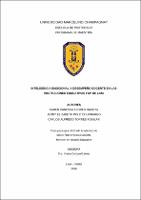Mostrar el registro sencillo del ítem
Inteligencia emocional y desempeño docente en las instituciones educativas FAP de Lima
| dc.contributor.advisor | Carbajal Llanos, Yvana | |
| dc.contributor.author | Flores Daorta, Karen Vanessa | |
| dc.contributor.author | Polo Churrango, Jenny Elizabeth | |
| dc.contributor.author | Torres Aguilar, Carlos Alfredo | |
| dc.date.accessioned | 2018-11-21T14:54:19Z | |
| dc.date.available | 2018-11-21T14:54:19Z | |
| dc.date.issued | 2018 | |
| dc.identifier.citation | Flores, K. V. ; Polo, J. E. y Torres, C. A. (2018). Inteligencia emocional y desempeño docente en las instituciones educativas FAP de Lima [Tesis de maestría, Universidad Marcelino Champagnat]. Repositorio institucional de la Universidad Marcelino Champagnat. http://repositorio.umch.edu.pe/handle/UMCH/544 | |
| dc.identifier.uri | https://hdl.handle.net/20.500.14231/544 | |
| dc.description.abstract | El objetivo de la presente investigación fue determinar la relación que existe entre la inteligencia emocional y el desempeño docente en las Instituciones Educativas FAP de Lima. Se utilizó el enfoque cuantitativo, con un diseño Descriptivo Correlacional Transaccional. La población de estudio estuvo conformada por 331 docentes de las dos instituciones FAP de Lima que, por técnica censal, es el tamaño de la muestra de estudio; no se empleó, por tanto, tipo de muestreo para su selección. Se aplicó el ICE NA Inventario de la Inteligencia Emocional de Baron (I – CE) adaptado por la Dra. Nelly Ugarriza y Liz Pajares que mide la Inteligencia Emocional, así como la ficha C2 diseñada por el Centro de Administración de Servicios Educativos – CASED – FAP para evaluar el desempeño docente en una sesión de aprendizaje. De acuerdo a los resultados obtenidos a través del procesamiento de datos, los resultados indican que existe relación directa y significativa entre la inteligencia emocional y el desempeño docente en las Instituciones Educativas FAP de Lima. (r= 0,581; Sig.= 0,000). De acuerdo a los resultados encontrados en esta investigación indican que los docentes se ubican predominantemente en un nivel adecuado (59,5%); 20,5%, en un nivel alto; y 19,9%, en un nivel bajo. En lo que corresponde al desempeño docente, los hallazgos en este trabajo muestran que los docentes se encuentran predominantemente en un nivel regular (65,6%). En cuanto a la contrastación de las hipótesis específicas, las primeras cinco corresponden a los componentes de la inteligencia emocional (intrapersonal, interpersonal, Adaptabilidad, Manejo de estrés, y Estado de ánimo general), cuya relación con el desempeño docente, según los resultados generados, es directa y significativa; es decir, mientras mayor es la puntuación en cada uno de tales componentes, mayor será la puntuación en el desempeño docente de la muestra investigada. | es_ES |
| dc.description.abstract | The objective of the present investigation was to determine the relationship between emotional intelligence and teacher performance in FAP Educational Institutions from Lima. The quantitative approach wasused,with a Descriptive Correlational Transactional Design. The study population consisted of 331 teachers from the two FAP institutions in Lima, which by census technique is the size of the study sample; therefore, no type of sampling was used for selection. The ICE NA “BarOn Emotional Quotient Inventory” was applied, and it was adapted by Dr. Nelly Ugarriza and Liz Pajares which measures Emotional Intelligence, as well as the C2 form designed by the Center for Administration of Educational Services - CASED - FAP to evaluate teacher performance in a learning session. According to results obtained through data processing, the results indicate that there is a direct and significant relationship between emotional intelligence and teaching performance in FAP Educational Institutions from Lima. (r = 0.581, Sig = 0.000). According to the results found in this research, they indicate that teachers are predominantly at an appropriate level (59.5%); 20.5%, at a high level; and 19.9%, at a low level. Regarding teacher performance, the findings in this study show that teachers are predominantly at a regular level (65.6%). According to the specific hypotheses; the first five correspond to the components of emotional intelligence (intrapersonal, interpersonal, adaptability, stress management, and general mood), whose relation to teacher performance, according to the results, is direct and significant; that is, the higher score on each of these components; higher will be the score in the teaching performance of the sample investigated. | en_US |
| dc.description.uri | Tesis | es_ES |
| dc.format | application/pdf | es_ES |
| dc.language.iso | spa | es_ES |
| dc.publisher | Universidad Marcelino Champagnat | es_ES |
| dc.rights | info:eu-repo/semantics/openAccess | es_ES |
| dc.rights.uri | http://creativecommons.org/licenses/by-nc-nd/2.5/pe/ | es_ES |
| dc.source | Repositorio institucional - UMCH | es_ES |
| dc.source | Universidad Marcelino Champagnat | es_ES |
| dc.subject | Desempeño docente | es_ES |
| dc.subject | Docente | es_ES |
| dc.subject | Inteligencia emocional | es_ES |
| dc.title | Inteligencia emocional y desempeño docente en las instituciones educativas FAP de Lima | es_ES |
| dc.type | info:eu-repo/semantics/masterThesis | es_ES |
| thesis.degree.name | Maestro en educación - mención en Gestión Educativa | es_ES |
| thesis.degree.grantor | Universidad Marcelino Champagnat. Escuela de Posgrado | es_ES |
| thesis.degree.level | Maestria | es_ES |
| thesis.degree.discipline | Gestión Educativa | es_ES |
| thesis.degree.program | Maestría Educación - Mención en Gestión Educativa | es_ES |
| dc.subject.ocde | https://purl.org/pe-repo/ocde/ford#5.03.01 | |
| renati.discipline | 191027 | |
| dc.publisher.country | PE |
Ficheros en el ítem
Este ítem aparece en la(s) siguiente(s) colección(ones)
-
Gestión Educativa [55]


